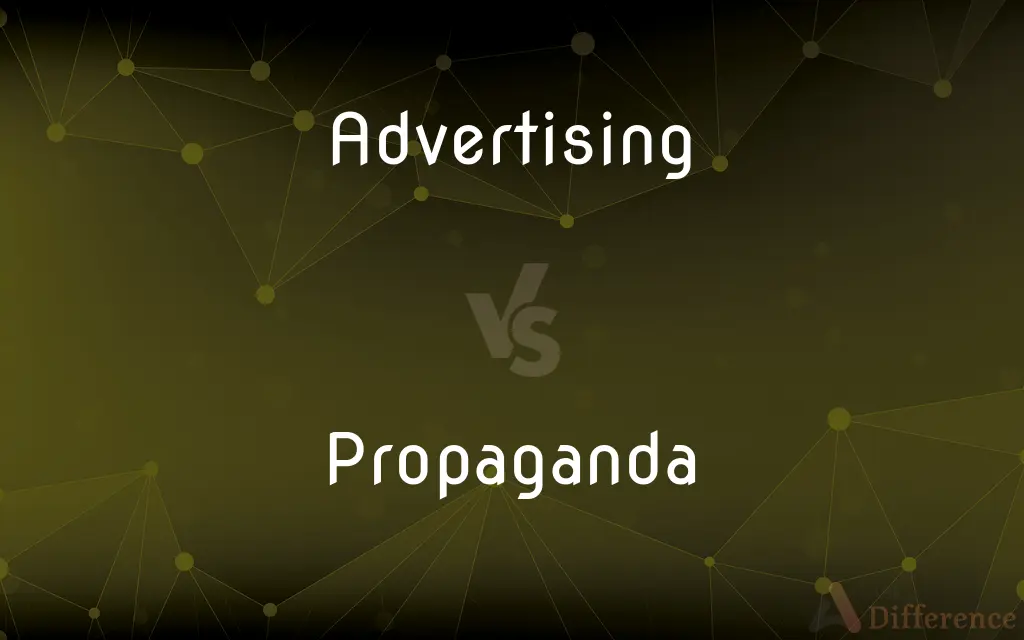Advertising vs. Propaganda — What's the Difference?
By Fiza Rafique & Urooj Arif — Updated on March 21, 2024
Advertising is a paid communication strategy aimed at promoting products or services, while propaganda seeks to influence public opinion or behavior, often for political purposes.

Difference Between Advertising and Propaganda
Table of Contents
ADVERTISEMENT
Key Differences
Advertising is a marketing tool used by businesses and organizations to promote their products, services, or brands to potential customers. It employs various media channels to reach a wide audience, focusing on the benefits and features of what is being promoted. On the other hand, propaganda is a communication technique aimed at influencing people's opinions, beliefs, or behaviors, typically for political, social, or ideological purposes. It often presents information in a biased or misleading way to shape public perception.
While advertising seeks to persuade consumers to make a purchase decision or adopt a brand preference, propaganda aims to mold public opinion or encourage certain actions in line with the propagandist's objectives. Advertisements are usually clear about their commercial intent, whereas propaganda might not always disclose its underlying motives or the entity behind it.
Advertising relies on creative strategies, branding, and consumer insights to craft messages that resonate with target audiences, often emphasizing product quality, innovation, or lifestyle alignment. Propaganda, however, may use emotional appeals, repetitive messages, and sometimes misleading information to strengthen its influence over public opinion.
In terms of regulation, advertising is subject to legal and ethical standards that ensure truthfulness, transparency, and fairness in commercial messaging. Propaganda, especially in political contexts, may operate with fewer constraints, exploiting media and communication channels to disseminate its messages widely.
The effectiveness of advertising is measured through metrics like sales figures, market share, and brand recognition, reflecting its impact on consumer behavior. In contrast, the impact of propaganda is assessed through changes in public opinion, social attitudes, or political outcomes, indicating its influence on societal or political landscapes.
ADVERTISEMENT
Comparison Chart
Purpose
To promote products or services
To influence public opinion or behavior
Intent
Commercial, aimed at persuading to buy or engage
Often political, social, or ideological
Disclosure
Transparent about commercial intent
May conceal motives or the entity behind it
Strategies
Creative strategies, branding, consumer insights
Emotional appeals, repetitive messages, misinformation
Regulation
Subject to legal and ethical standards
Fewer constraints, especially in political use
Effectiveness Measurement
Sales, market share, brand recognition
Changes in public opinion, social attitudes
Compare with Definitions
Advertising
Advertising is a paid promotion of products or services.
The new ad campaign boosted the product's sales.
Propaganda
Propaganda seeks to influence opinions or behaviors.
The propaganda campaign aimed to sway public opinion.
Advertising
It utilizes various media channels for maximum reach.
The company used social media for targeted advertising.
Propaganda
It can present information in a biased or misleading way.
The leaflet used propaganda to distort the facts.
Advertising
Advertisements often highlight benefits and features.
The advertisement emphasized the smartphone's advanced camera.
Propaganda
Propaganda's impact is seen in shifts in public opinion.
The propaganda led to significant changes in public attitudes.
Advertising
Advertising is regulated to ensure truthfulness.
The advertising agency adhered to ethical standards in their campaign.
Propaganda
Emotional appeals are commonly used in propaganda.
The propaganda film appealed to viewers' emotions.
Advertising
The goal is to persuade consumers to make purchases.
Effective advertising convinced many to try the new beverage.
Propaganda
The intent is often political or ideological.
The group spread propaganda to promote their political ideology.
Advertising
Advertising is a marketing communication that employs an openly sponsored, non-personal message to promote or sell a product, service or idea. Sponsors of advertising are typically businesses wishing to promote their products or services.
Propaganda
Propaganda is communication that is primarily used to influence an audience and further an agenda, which may not be objective and may be selectively presenting facts to encourage a particular synthesis or perception, or using loaded language to produce an emotional rather than a rational response to the information that is being presented. Propaganda is often associated with material which is prepared by governments, but activist groups, companies, religious organizations, the media, and individuals also produce propaganda.
Advertising
The activity of attracting public attention to a product or business, as by paid announcements in the print, broadcast, or electronic media.
Propaganda
The systematic propagation of a doctrine or cause or of information reflecting the views and interests of those advocating such a doctrine or cause.
Advertising
The business of designing and writing advertisements.
Propaganda
Material disseminated by the advocates or opponents of a doctrine or cause
Wartime propaganda.
Advertising
Advertisements considered as a group
This paper takes no advertising.
Propaganda
A concerted set of messages aimed at influencing the opinions or behavior of large numbers of people.
Advertising
Communication whose purpose is to influence potential customers about products and services.
Propaganda
A congregation of cardinals, established in 1622, charged with the management of missions.
Advertising
The industry or profession made up of such communications.
Propaganda
Hence, any organization or plan for spreading a particular doctrine or a system of principles.
Advertising
Present participle of advertise
Propaganda
Information that is spread for the purpose of promoting some cause
Advertising
A communication publicly promoting some product or service.
Advertising
The business of advertising; the activity engaged in by professional publicists for pay.
Advertising
A public promotion of some product or service
Advertising
The business of drawing public attention to goods and services
Common Curiosities
Can advertising be considered a form of propaganda?
While advertising can sometimes use persuasive techniques similar to propaganda, its primary goal is commercial, making it distinct from propaganda's often political or ideological aims.
How are advertising messages regulated?
Advertising is subject to legal and ethical standards that ensure messages are truthful, transparent, and fair.
How do advertising and propaganda differ in purpose?
Advertising aims to persuade consumers to buy or engage with products, while propaganda seeks to shape public opinion or behaviors for broader objectives.
What is propaganda?
Propaganda is a communication technique designed to influence public opinion or behavior, often for political, social, or ideological purposes.
How do advertisers ensure their messages resonate with audiences?
Advertisers use creative strategies, consumer insights, and branding to craft messages that align with their target audience's preferences and lifestyles.
Can social media be used for both advertising and propaganda?
Yes, social media platforms are used for both advertising products and services and for spreading propaganda due to their wide reach and engagement potential.
What is advertising?
Advertising is a paid communication strategy aimed at promoting products, services, or brands to potential customers.
What are common strategies used in propaganda?
Propaganda often employs emotional appeals, repetitive messaging, and sometimes misleading information to influence its audience.
How do entities behind propaganda campaigns benefit?
Entities behind propaganda benefit by achieving their desired outcomes, whether it's gaining political power, influencing policy, or shaping societal norms.
What are the effects of propaganda on society?
Propaganda can significantly impact society by altering public opinion, shaping social attitudes, and even influencing political outcomes.
Why is transparency important in advertising?
Transparency ensures consumers are aware of the commercial intent behind messages, allowing them to make informed decisions.
How can consumers distinguish between advertising and propaganda?
Consumers can distinguish them by analyzing the message's intent, the transparency of its source, and whether it seeks commercial engagement or aims to influence opinion or behavior.
How can the negative effects of propaganda be mitigated?
Education, critical thinking, media literacy, and regulatory measures can help mitigate the negative effects of propaganda by empowering individuals to critically evaluate the information they encounter.
What role does media play in disseminating propaganda?
Media serves as a crucial channel for disseminating propaganda, reaching wide audiences and amplifying the intended message.
What impact does digital technology have on advertising and propaganda?
Digital technology has amplified the reach and sophistication of both advertising and propaganda, allowing for targeted messaging and the rapid spread of information.
Share Your Discovery

Previous Comparison
Bloke vs. Broke
Next Comparison
Macrometer vs. MicrometerAuthor Spotlight
Written by
Fiza RafiqueFiza Rafique is a skilled content writer at AskDifference.com, where she meticulously refines and enhances written pieces. Drawing from her vast editorial expertise, Fiza ensures clarity, accuracy, and precision in every article. Passionate about language, she continually seeks to elevate the quality of content for readers worldwide.
Co-written by
Urooj ArifUrooj is a skilled content writer at Ask Difference, known for her exceptional ability to simplify complex topics into engaging and informative content. With a passion for research and a flair for clear, concise writing, she consistently delivers articles that resonate with our diverse audience.














































